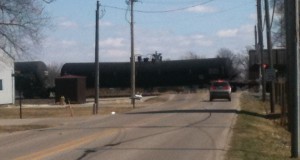RR Spokesman: ‘Growth’ Behind Blocked Crossings

Becoming an all too common scenario, a Norfolk Southern train blocks the CR 350 North crossing in Warsaw. Motorists are realizing growing frustrations as the times that the crossing is blocked continues to grow. Today, a northbound train blocked the crossing from 9:50 a.m. to 12:33 p.m. (Photo provided)
StaceyPageOnline.com and Warsaw Mayor Joe Thallemer have been actively trying to help local motorists understand why main railroad crossings are being blocked by Norfolk Southern trains so frequently and for such long periods of time. Since January, we have sought to get answers. (See story)
Residents especially affected by what they say is becoming an epidemic blocking (see related story) of the CR 350 North crossing, have been keeping accounts of when and for how long the trains are stopped there. Just today, a northbound train stopped and block at least the CR 350 North crossing from approximately 9:50 a.m. until 12:33 p.m.
David Pidgeon, public relations manager for Norfolk Southern just recently responded to our inquiry noting, “What residents of Warsaw may be experiencing is growth in rail traffic on that Norfolk Southern line. As many as 30 trains a day can use that line and that crossing, and one of the challenges we have is that line crosses over tracks owned by another railroad; at a crossing controlled by that railroad.”
Mayor Thallemer contacted the railroad via email on Tuesday said today he has still not received a reply.
Pidgeon, however, also offered that Norfolk Southern wrestles with the fact that there is only one main line track that runs through Warsaw. “We simply cannot move a train off the track so other trains can pass by,” he said. “The other reasons why crossings may be temporarily occupied … are track obstructions, mechanical issues, track maintenance, crew changes and so on.”
In Indiana, a railroad corporation is not permitted to have any train obstruct public railroad crossings for more than 10 minutes “except where such train, railroad car or engine cannot be moved by reason of circumstances over which the railroad corporation has no control.”
“We understand the inconvenience this can cause motorists and residents of Warsaw,” added Pidgeon. “We have employees from Warsaw, and they use the same roads as other residents do to commute to work, to run errands, to make appointments and so on. We understand the frustration. And it’s not in our best business interests to occupy crossings any longer than we have to.
“As business grows on this line, so does the regional economy, and we’ll consider in the future ways to improve the efficiency of our rail network to successfully serve our customers.”
